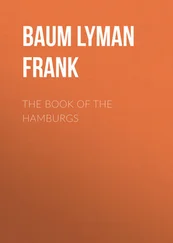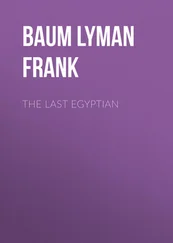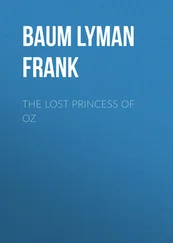L. Baum - The Last Egyptian
Здесь есть возможность читать онлайн «L. Baum - The Last Egyptian» весь текст электронной книги совершенно бесплатно (целиком полную версию без сокращений). В некоторых случаях можно слушать аудио, скачать через торрент в формате fb2 и присутствует краткое содержание. Год выпуска: 2019, Издательство: epubBooks Classics, Жанр: Прочие приключения, на английском языке. Описание произведения, (предисловие) а так же отзывы посетителей доступны на портале библиотеки ЛибКат.
- Название:The Last Egyptian
- Автор:
- Издательство:epubBooks Classics
- Жанр:
- Год:2019
- ISBN:нет данных
- Рейтинг книги:4 / 5. Голосов: 1
-
Избранное:Добавить в избранное
- Отзывы:
-
Ваша оценка:
- 80
- 1
- 2
- 3
- 4
- 5
The Last Egyptian: краткое содержание, описание и аннотация
Предлагаем к чтению аннотацию, описание, краткое содержание или предисловие (зависит от того, что написал сам автор книги «The Last Egyptian»). Если вы не нашли необходимую информацию о книге — напишите в комментариях, мы постараемся отыскать её.
The Last Egyptian — читать онлайн бесплатно полную книгу (весь текст) целиком
Ниже представлен текст книги, разбитый по страницам. Система сохранения места последней прочитанной страницы, позволяет с удобством читать онлайн бесплатно книгу «The Last Egyptian», без необходимости каждый раз заново искать на чём Вы остановились. Поставьте закладку, и сможете в любой момент перейти на страницу, на которой закончили чтение.
Интервал:
Закладка:
At twilight they anchored midway between Beni–Hassan and Antinoe, the boat lying motionless a few yards away from the east bank.
The evenings are delightful in this part of Egypt, and it was midnight before the passengers aboard the dahabeah sought their couches. Tadros, indeed, being wakeful, lay extended upon the stern deck of the steamer long after the others were asleep, engaged in thoughtfully gazing at the high bank and indulging in pleasant dreams of future prosperity when he had added Winston Bey’s three thousand pounds to the snug savings he had already accumulated.
Presently a dark object appeared for an instant at the top of the bank and quickly vanished against the black surface below. Another succeeded it, and another.
Tadros scratched his head in perplexity. These dark objects seemed to have form, yet they were silent as the dead. He counted a dozen of them altogether, and while still pondering upon their appearance, being undecided as to whether they were ghosts or jackals, his quick ears caught a splash in the water beside the bank.
They were not jackals—that was certain; for those ravenous beasts never take to the water. Neither are ghosts supposed to bathe. From where he lay, the surface of the river was scarcely a foot distant, and, leaning well over the stern, Tadros managed to discover in the dim light several heads bobbing upon the water.
He ought to have given an immediate alarm, but terror rendered him irresolute, and before he had time to act, it was too late to arouse his fellow–passengers.
Clambering up the bow were half a score of naked Arabs, their knives held between their glistening teeth, their dark eyes roaming fiercely around.
Tadros’ first impulse was to fight; but just as he was about to rise to his feet a man whom he knew bounded aft and sprang into the little cabin where the women lay asleep.
It was Kāra.
There was no indecision on the part of the dragoman after that. He slipped off the deck into the water with the dexterity of a seal sliding from a rock, and while a succession of terrified screams and angry shouts bombarded his ears, Tadros swam silently across the Nile toward the opposite shore.
The water was cold, and he shivered as he swam; yet the chill was from within rather than from without. There are no crocodiles in the Nile now; but in places there are serpents and sharklike fish that will bite a mouthful of flesh from a swimmer’s leg. Tadros knew of this, but did not think of it just then. Reflected in his mind was Kāra’s dark visage, grim and malignant, and with certain death facing him aboard the dahabeah, the dragoman’s only impulse was to get as far away from the danger as possible.
The turmoil on the boat prevented his escape from being immediately noticed, and after a long swim, that nearly exhausted his strength, he reached the west shore and fell panting upon the hard earth.
Slowly regaining his breath, he strained his ears to catch any sound that might proceed from the dahabeah; but now an oppressive silence reigned on the opposite side of the river. The lights of the steamer gleamed faintly through the night, but the fate of those he had left on board was wrapped in mystery. Perhaps Kāra and his band of assassins would murder all except the girl; it was possible he would murder her as well. Anyway, the dragoman’s connection with the enterprise had come to an abrupt ending.
A mile or so away was the little town of Roda, with its railway station. Tadros started to walk toward it, keeping well back from the edge of the bank so that he might not be discovered in case anyone pursued him.
His dejection and dismay at this sudden reversal of fortune were extreme. He had lost the last vestige of the jaunty bearing that usually distinguished him. With three thousand pounds already earned but irretrievably lost, and the knowledge that Kāra’s merciless enmity would pursue him through life, the dragoman’s condition was indeed deplorable.
He wondered what he should do now. Returning to Cairo was out of the question. He would go back to Fedah, his old home. Nephthys and her mother were there, and would hide him if Kāra appeared unexpectedly. Yes, Fedah was his only haven—at least until he had time to consider his future plans.
By and by he reached the station at Roda—the village named after the ancient island in the Nile opposite Cairo. A sleepy Arab porter was in charge of the place and eyed the dragoman’s wet clothing with evident suspicion. When questioned, he announced that a train would go south at six o’clock in the morning.
Tadros slipped outside the station and found a convenient hiding–place against a neighboring house, where the shadows were so deep that he could not be observed. Here he laid down to rest and await the arrival of the train.
By daybreak his clothing had dried, but he observed with regret that his blue satin vest had been ruined by the river water and that his Syrian sash was disgracefully wrinkled. Next to life itself, he loved his splendid costumes, so that this dreary discovery did not tend to raise his dampened spirits.
When the train drew in he boarded it and found himself seated in a compartment opposite to Lord Consinor. They stared at each other for a moment, and then the viscount emitted a sound that seemed a queer combination of a growl and a laugh.
“It is Kāra’s alter ego,” he sneered, in English.
“Pardon me, my lord,” said the dragoman, hastily, “the alliance is dissolved. I have even more reason than you to hate the prince.”
“Indeed?” returned Consinor.
“He is a fiend emanating directly from your English hell,” declared Tadros, earnestly. “I know of no other diabolical place where Kāra could have been bred. One thing is certain, however,” he continued, with bitter emphasis, “I will have vengeance upon him before I die!”
There was no mistaking the venom of the man’s rancorous assertion. Consinor smiled, and said:
“It would give me pleasure to share your revenge.”
A sudden thought struck Tadros—a thought so tremendous in its scope and significance that he was himself astonished and stared blankly into the other’s face. For a time he rode in silence, revolving the idea in his mind and examining its phases with extreme care. Then he inquired, cautiously:
“Where are you going, my lord?”
“To Assyut.”
“I thought you had left Cairo long ago.”
“So I did. I have been to Alexandria, but found nothing there to amuse me. I am now bound for Assyut, and from there I intend traveling to Aswan, and up to Wady Halfa.”
“Are you in any hurry to reach there?”
“Not the slightest.”
“Then leave the train with me at Kusiyeh. I have something to propose that will interest you.”
Consinor studied him a moment.
“Does this program include our revenge?” he asked.
“Yes.”
“Very well; I will do as you suggest.”
“Good!” exclaimed Tadros. Then he leaned over and whispered: “Revenge and a fortune, my lord! Is it not worth while?”
Chapter XXII
The Dragoman’s Inspiration
They left the train at the station opposite Fedah, and the dragoman secured a native to row them in his skiff across the river. Consinor asked no questions and appeared wholly indifferent as to their destination. Indeed, his life had been so aimless since his disgraceful flight from Cairo that he welcomed any diversion that might relieve its dull monotony.
When they arrived at Fedah, Tadros took him secretly to the hut of old Nefert, the bread–baker, which was directly across the street from the dwelling of Hatatcha, now owned by Kāra. The viscount was inclined to resent the filthiness of the hovel wherein he must hide, until the dragoman led him to the shade of the opposite archway and explained to him something of the project he had in mind.
Читать дальшеИнтервал:
Закладка:
Похожие книги на «The Last Egyptian»
Представляем Вашему вниманию похожие книги на «The Last Egyptian» списком для выбора. Мы отобрали схожую по названию и смыслу литературу в надежде предоставить читателям больше вариантов отыскать новые, интересные, ещё непрочитанные произведения.
Обсуждение, отзывы о книге «The Last Egyptian» и просто собственные мнения читателей. Оставьте ваши комментарии, напишите, что Вы думаете о произведении, его смысле или главных героях. Укажите что конкретно понравилось, а что нет, и почему Вы так считаете.












